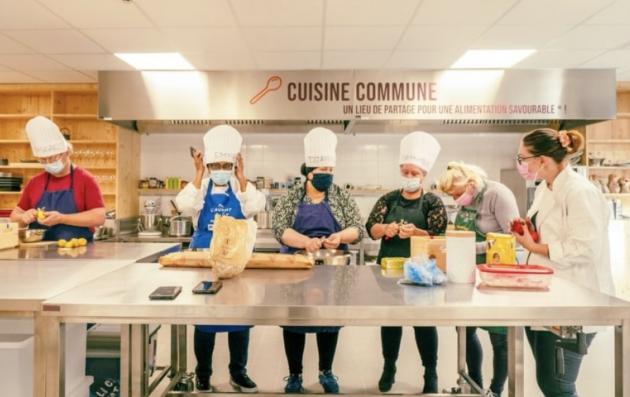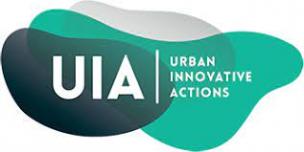Summary
At Fives, the closure of the metallurgic “Fives Cail Babcock” company in 2001 has been a tremendous shock for the population. Once carried up by the industrial fleuron, the neighbourhood has dramatically declined. With more than 20% unemployment rate (mostly long term); half of the population lives under the poverty level. Young people (half of population is under 30) can meet little job opportunity in the surroundings.
To reverse negative trends of urban poverty in the deprived neighbourhood of Fives and as part of a larger urban brownfield regeneration development, the project aims at (re)introducing productive activities centred on food. At the heart of the brownfield, a building of 2050 m2 has been renovated to host an innovative combination of activities in the fields of urban agriculture, production, culinary transformation and catering.
The project has been able to use food-related activities to seek and leverage against urban poverty. It has also developed prefiguration as a tool to testing a future Food Court in real-life.
Gentrification process is addressed from the start. Also, the existing population is the subject of special attention and is identified as the main target of the activities deployed. This project has integrated all the beneficiaries – and related partners – to co-create the most suitable building and activities for them all.
The innovative solution
The inhabitants of the FIVES neighbourhood are struggling with the following main issues: seclusion, lack of social interactivity, health problem, lack of training and job opportunities and loss of pride.
A central food hall has been created and mix cooking, productive and food-services activities: A “ Community kitchen” inviting neighbourhood inhabitants to join workshops and events; a professional kitchen hosting an Incubator to food projects and solidary caterer for skills development; a food Court to meet and gather around sustainable local meals and festivals; an urban farm combining training for agricultural job and pedagogy for citizens.
A collaborative and participative work
The project gathers 14 partners combining local authorities in charge of the future of the site (Ville de Lille) as well as in charge of social policies (CCAS), as well as the metropolitan area (Métropole Européenne de Lille) – together with researchers to support investigation in urban farming (ISA/Yncréa Hauts-de France) and in the evaluation (Maison Européenne des Sciences de l’Homme et de la Société), and stakeholders who are familiar with working with precarious publics («Les sens du Goût», Fédération du Nord du Secours Populaire Français, La Sauvegarde du Nord). Other partners supported the activities around jobs and skills (Maison de l’Emploi de Lille, Lomme, Hellemmes (MDE) and A table citoyens !/Baluchon) as well as media activities (Rencontres Audiovisuelles) and IT development activities (Le Centre d’Innovation des Technologies sans Contact). Finally, EPARECA/ANCT, a public /private company has been involvement for the purchase and management of the site.
The project was managed via a collective governance model involving all the partners. The design of the future Food hall was co-created with the local residents and participants to the activities.
The impact and results
The project was prototyped during 3 years at a temporary site, L’Avant-Goût de la cuisine commune, to allow residents and stakeholders to get to know the future project ; provide local NGOs and residents with facilities and material to cook, produce and process food; provide inhabitants with an open space for social activities several days a week, and, and develop a regulatory framework adapted to the objectives of the project. The learnings fed into the design for the future site, “Chaud Bouillon !”.
The results of the first 2 years of the project (from sept 2017 to June 2019), located at L’Avant-Goût, are: 15 000 users of the site; 23 events for the general public; 120 000 visitors during the summer; 500 cooking workshops; more than 100 partners involved.
Why this Good Practices should be transferred to other cities?
TAST’in FIVES has aimed to address an EU level priority, that is at the core of the Europe 2020 strategy and one of the 5 targets for 2020: 20 million less people at risk of poverty in 2020 compared to 2010. While it is clear today that this EU target will not be reached, cities are still working hard to combat poverty and social exclusion at local level. The solution proposed here combines a mix of relevant and complementary stakeholders in using food as a leverage against poverty in a dedicated building. Other cities, as well as job centres, or anti-poverty NGOs, might be interested in transferring part of or the entire project. The project is indeed quite adaptable as it is co-constructed with the knowledge of the NGOs on their beneficiaries and the beneficiaries themselves, together with a learning process and transformation for all.


